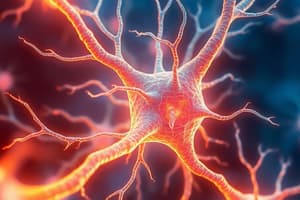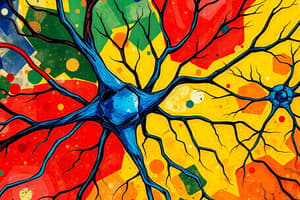Podcast
Questions and Answers
What are the fundamental principles that cellular life is built upon?
What are the fundamental principles that cellular life is built upon?
Cell structure, function, and communication
Name the pivotal components of a cell that enable essential tasks like energy production and waste removal.
Name the pivotal components of a cell that enable essential tasks like energy production and waste removal.
Cell membrane, organelles, and cytoskeleton
What are the two primary components of the nervous system?
What are the two primary components of the nervous system?
Central nervous system (CNS) and peripheral nervous system (PNS)
What are the specialized cells in the nervous system responsible for transmitting information?
What are the specialized cells in the nervous system responsible for transmitting information?
Which part of the neuron facilitates long-distance communication?
Which part of the neuron facilitates long-distance communication?
What are neurotransmitters and how do they facilitate communication between neurons?
What are neurotransmitters and how do they facilitate communication between neurons?
Describe the structural and functional features of neurons.
Describe the structural and functional features of neurons.
How do neurons communicate with each other at synapses?
How do neurons communicate with each other at synapses?
What supporting structures does the nervous system rely on for its functions?
What supporting structures does the nervous system rely on for its functions?
How has research in cell biology and the nervous system contributed to scientific advancements?
How has research in cell biology and the nervous system contributed to scientific advancements?
Study Notes
Exploring Cell Biology and the Nervous System
Cell biology and the nervous system represent two captivating fields within the vast discipline of biology. Understanding these topics provides a deeper appreciation for the intricate workings of life itself.
Cell Biology Basics
Cellular life is built upon the fundamental principles of cell structure, function, and communication. Cells perform a multitude of essential tasks, including energy production, waste removal, and reproduction. The cell membrane, organelles, and cytoskeleton are pivotal components that enable these processes.
The Nervous System
The nervous system is a complex network of specialized cells, known as neurons, that transmit information via electrical and chemical signals. The nervous system can be divided into two primary components: the central nervous system (CNS), consisting of the brain and spinal cord, and the peripheral nervous system (PNS), which includes sensory and motor nerves.
Cells and the Nervous System: Interconnected
The nervous system is composed of neurons, which are specialized cells that communicate with each other and other cells to orchestrate a wide range of physiological processes. These cells possess unique features, such as an extended structure called the axon, which facilitates long-distance communication, and synapses, where signals are transmitted to other neurons or target cells.
The Importance of Communication
The nervous system relies on communication to execute its functions, such as processing, storing, and retrieving information. Neurons communicate with one another via neurotransmitters, which are chemical messengers that facilitate the passage of information across synapses. The nervous system's ability to process and transmit information rapidly enables complex behaviors and higher cognitive functions.
A Closer Look at Neurons
Neurons are the primary information processing units of the nervous system. They possess unique structural and functional features, including:
- A cell body, also known as soma, containing the nucleus and essential cellular machinery.
- Dendrites, which receive information from other neurons.
- Axons, which transmit information away from the cell body to other neurons or target cells.
Communication and Neuron Function
Neurons communicate with each other via synapses, where neurotransmitters are released by one neuron and bind to receptors on the next neuron's dendrites, initiating a response. The nervous system's ability to process and transmit information rapidly enables complex behaviors and higher cognitive functions.
The Role of Supporting Structures
The nervous system relies upon supporting structures to facilitate its functions, including:
- The extracellular matrix, a complex network of proteins and carbohydrates that provides structural and biochemical support to neurons.
- Glial cells, which assist neurons in various functions, such as providing support, metabolic functions, and maintaining homeostasis.
Advances in Research and Applications
Research in cell biology and the nervous system has led to numerous scientific advancements, including the development of novel treatments for neurological disorders, improved understanding of disease mechanisms, and innovative applications in areas such as stem cell therapy and regenerative medicine.
In summary, cell biology and the nervous system are intimately interconnected fields that provide a deep understanding of life's most complex processes. Through a combination of cellular structures, communication mechanisms, and supporting structures, the nervous system is able to process, store, and transmit information that enables a wide range of physiological functions. The ongoing exploration of these topics continues to expand our knowledge and drive scientific advancements.
Studying That Suits You
Use AI to generate personalized quizzes and flashcards to suit your learning preferences.
Description
Explore the fascinating realms of cell biology and the nervous system with this quiz. Test your knowledge on cell structure, function, neurons, communication mechanisms, and their interconnected roles in physiological processes.




